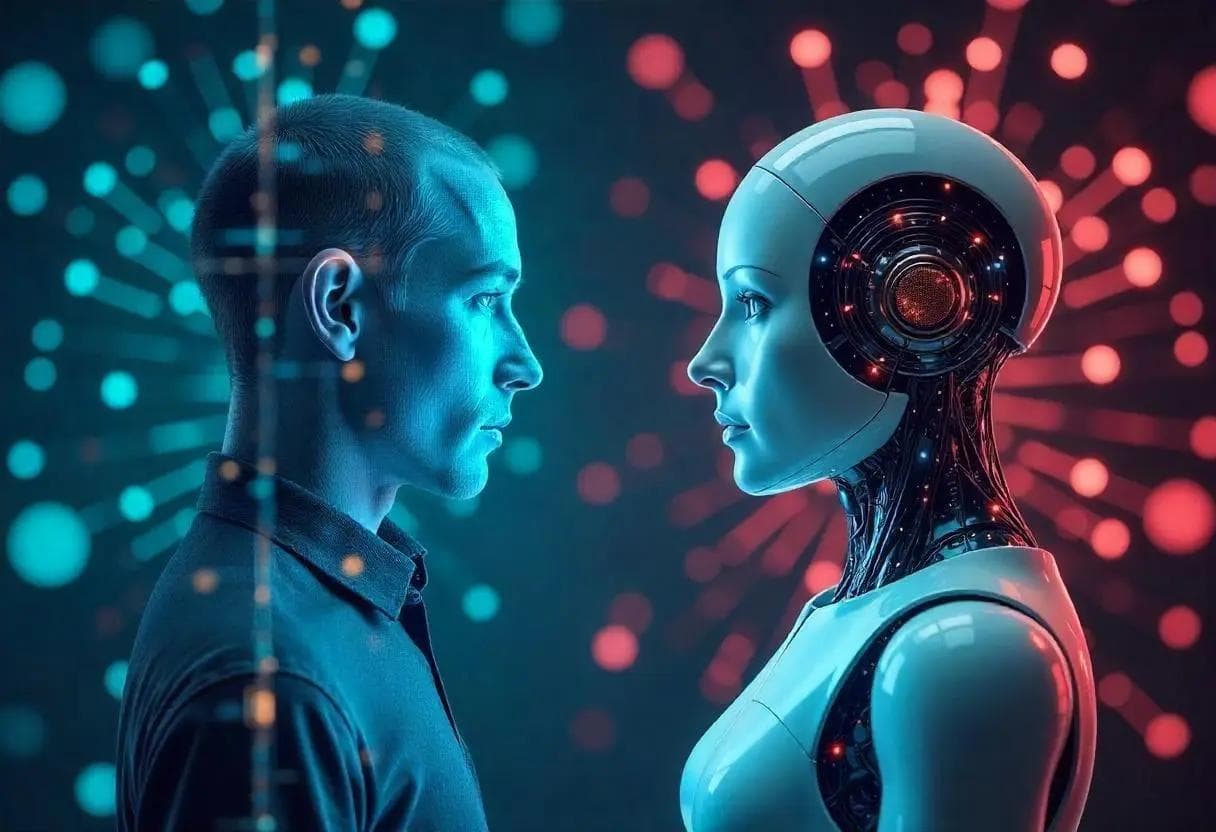
By Himanshu Sharma • 10/27/2024
Artificial Intelligence (AI) is no longer a futuristic concept. It is already here and is transforming industries and changing the concept of work at a dizzying pace. The development in self-driving cars and medical diagnoses further underscores the steady progress of AI. Yet, this technological revolution carries a nagging thought: the possible fear of job loss.
While AI may promise higher productivity and efficiency, it grossly invokes sentiments of worry about firing personnel: as the sophistication of AI passes through leaps and bounds, there will be no need for many human-performed actions which will lead to phasing out jobs across multiple sectors.
AI is rapidly automating routine tasks across a broad spectrum of activities, from data entry and customer service to manufacturing and logistics. By all means, low-skilled workers engage in highly repetitive basic tasks; however, these are now increasingly being handled by intelligent systems. Although the benefits of automation include efficiencies and cost savings, it holds concerns for job redundancy.
Quite the opposite, AI is bringing about a wave of innovation, generating completely new industries and jobs that were highly unimaginable. For instance, autonomous vehicles have opened up avenues for engineers, software developers, and logistics managers. Even AI-enabled healthcare is seeing development in drug discovery, personalized medicine, and medical imaging.
The future of work will likely involve much human-AI collaboration. AI can execute routine tasks and perform data analysis, while humans bring creativity, critical thinking, and emotional intelligence to the table. Working together, humans and AI can drive productivity and innovation to new heights.
AI-based tools can assist writers in thinking, conducting further research, and even editing drafts. Nevertheless, the final outcome demands creative thought and human judgment and thus shall remain the purview of human authors.
Technology enabled by artificial intelligence is bound to disrupt several industries. As a result, many jobs are due to be lost, and certain industries are more susceptible to losing jobs than others; manufacturing, customer service, and transportation have been rated highest as vulnerable. The McKinsey Global Institute published that by 2030, up to 800 million jobs may have been lost to automation for up to 15% of the working population world over. This increases income inequality, as lesser-skilled jobs are more easily subsumed under automation.
The new upsurge of AI calls for a workforce that is well-equipped with new capabilities. Workers must adapt to a new job market, gaining digital literacy skills, critical thinking skills, and problem-solving skills. However, the education and training sectors' actions might not wholly counter this gap. Governments and institutions should invest heavily in lifelong learning programs with the aim of equipping workers for the future.
AI algorithms are trained on huge datasets that open their models to bias. Biased algorithms can prompt discriminatory outcomes, thus leading to unjust hiring procedures and rights-denying loan approvals. Protecting fairness and transparency in AI development can help mitigate such scenarios.
Moreover, AI has brought to light issues of privacy and security. Due to their data-harvesting and analicising nature, procedural safeguards for individual privacy would deem themselves most appropriate.
AI's expected impact on the market has attracted considerable focus of governments worldwide. Hence, governments in various countries are putting into effect frameworks to brace their workers and companies for this likely transition. The EU has been drafting regulations to introduce the ethics of AI developing and deploying; the US did invest a lot in AI R&D. No doubt, governments could ameliorate the fallout holding AI from destroying other jobs.
Companies thus have an important role to play when it comes to addressing the challenges posed by AI. A number of organizations are engaged in retraining and upskilling programs to prepare their workforce for the new types of jobs. Moreover, those companies are making responsible AI development a top priority, ensuring that AI systems are developed in a responsible and trustworthy manner. All these steps will therefore assure the protection of company workforce and boost good corporate reputation with assured longevity.
Individuals could prepare themselves for the future of work. Lifelong learning will be imperative, as new skills and knowledge will be needed to stay competitive in the AI era. Soft skills will become even more valuable with the automation of mundane tasks. In investing in their own development, individuals can adopt measures to succeed in AI-age.
AI is indeed a potent innovation and progress tool that offers several advantages, but it raises several problems, including job dislocation. As AI continues to develop, the way forward is to create the balance between leveraging it as an opportunity and the need to mitigate its disadvantage.
Investing in education and training would therefore provide a unique opportunity for the governments and businesses to equip their respective workers with sufficient skills needed to thrive in this artificial intelligence era. This further must be supported with ethical guidelines and regulation to allow AI development and implementation in a humane way.
Ultimately, the future of work would not be shaped just by human ingenuity but also by technological advancement. It is thus possible to embrace AI as a means of progress and yet still open up a future where humans and machines collaborate towards building the extraordinary.
| Latest Blogs |

Shunyity Tech Solutions is a leading provider of innovative IT solutions. We provide a wide range of services to help you achieve your goals.
Follow us
Our Services
Digital MarketingArtificial IntelligenceMachine LearningWebsite DevelopmentCybersecurityCloud SolutionsData AnalyticsEnterprise SolutionsMobile App DevelopmentSoftware DevelopmentIT ConsultancyLearning and IT TrainingContact Us